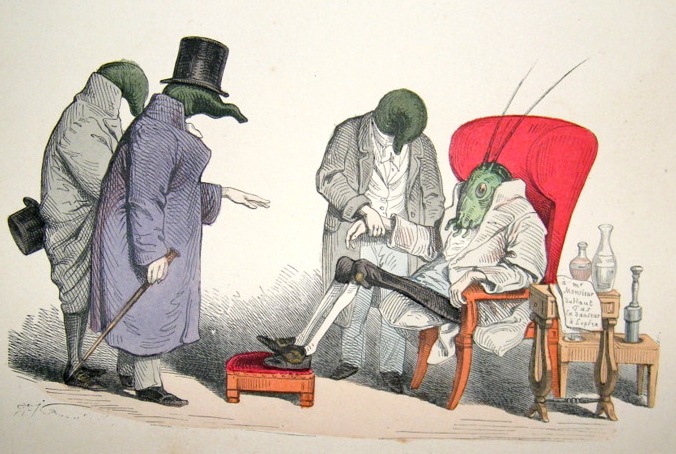“The world of my parents, and that of their children, dramatically improved in the latter half of the twentieth century as modern medicine introduced an array of effective vaccines and antibiotics,” writes Jerome Groopman, reviewing On Immunity by Eula Biss in the March 5, 2015, issue of The New York Review of Books. “When the Salk vaccine against the polio virus became available… I was inoculated, along with my siblings. The idea of preventing or curing dreaded infectious diseases ‘naturally,’ relying on the body alone, hardly entered our minds.”
Eula Biss is one of many parents for whom the decision to inoculate a child, in 2015, is not so simple. “We fear that vaccination will invite autism or any one of the diseases of immune dysfunction that now plague industrialized countries—diabetes, asthma, and allergies,” she writes. “We fear that the hepatitis B vaccine will cause multiple sclerosis, or that the diphtheria-tetanus-pertussis vaccine will cause sudden infant death. We fear that the combination of several vaccines at once will tax the immune system, and that the total number of vaccines will overwhelm it.”
In the era between Jerome Groopman’s vaccination and Eula Biss’s indecision, The New York Review has published many articles on what Groopman, considering the origin of Biss’s anxieties, calls our “culture of suspicion,” the widespread unease with expertise and mistrust of authority that complicates relations between doctors and patients. A selection of these articles is presented below.
Richard Horton, editor of The Lancet and the author of Health Wars: On the Global Front Lines of Modern Medicine, examines the shortcomings of institutionalized medicine in two essays, one on compromised medical research, and another on The Doctors’ Plague, the biography of a Viennese doctor whose discovery that colleagues were unwittingly spreading infection saved the lives of patients, but alienated him from the medical establishment.
The Dawn of McScience
March 11, 2004
If personal virtue has indeed given way to impersonal expertise, and if moral character has become secondary to institutional prestige, it would be wrong to conclude that the connection between public trust and the integrity of the individual scientist has been wholly erased. But it has often become subject to a new set of institutional authorities. And this is a source of contemporary anxiety.
The Fool of Pest
February 26, 2004
His work prepared the way for Pasteur’s elucidation of germ theory. He turned obstetrics into a respectable science. And he revealed how professional eminence and authority could breed crass stupidity and bitter jealousy. Yet this Hungarian émigré died in Vienna broken and alone, abandoned by his family and his colleagues in a Viennese lunatic asylum.
In his review of The Creative Destruction of Medicine by Eric Topol, Arnold Relman questions whether advances in medical technology will produce better healthcare, or a wealth of useless information and wealthier technology executives.
A Coming Medical Revolution?
October 25, 2012
Topol heralds the coming of “personalized” medicine, in which the convergence of digitized information from all these sources will enable patients to make most of the decisions now reserved to physicians. There will be a parity of knowledge between patient and doctor, which he calls the “democratization” of medical information.
Among several articles written for The New York Review on the practices of the pharmaceutical industry, Marcia Angell has advocated for reforms to curb corporate influence on the US Food and Drug Administration, in her review of Reputation and Power by Daniel Carpenter, and investigated the insidious influence of money on academic expertise and the integrity of practitioners, in an omnibus review of books on the subject.
FDA: This Agency Can Be Dangerous
September 30, 2010
Drug companies, of course, want to sell safe and effective drugs, but their primary purpose, like that of other investor-owned businesses, is to enhance the value of their shareholders’ stock by maximizing profits. If they did not do that, their top executives would risk being fired. The job of regulators, on the other hand, is to enforce legal constraints that often moderate the profit incentive.
Drug Companies & Doctors: A Story of Corruption
January 15, 2009
No one knows the total amount provided by drug companies to physicians, but I estimate from the annual reports of the top nine US drug companies that it comes to tens of billions of dollars a year. By such means, the pharmaceutical industry has gained enormous control over how doctors evaluate and use its own products. Its extensive ties to physicians, particularly senior faculty at prestigious medical schools, affect the results of research, the way medicine is practiced, and even the definition of what constitutes a disease.
Many of the contributions to The New York Review by Richard C. Lewontin have adopted a perspective skeptical of scientific claims to absolute truth and unbiased objective knowledge. In two such reviews, Lewontin writes on the political context of scientific progress, and the conflicted role of science in a world of believers.
The Politics of Science
May 9, 2002
How is the democratic state to function if the mass of the citizens is dependent on the expert knowledge available only to a tiny elite, an elite that in its formation and direct economic interest comes to represent only a narrow sector of society? Why would the Salvadoran immigrant woman who cleans my office believe that she and the Alexander Agassiz Research Professor at Harvard have sufficient commonality of interest and world view that she ought to trust my opinion on whether her meager hourly wage should be taxed to support the Human Genome Project?
Advertisement
Billions and Billions of Demons
January 9, 1997
Scientists apparently do not realize that the repeated promises of benefits yet to come, with no likelihood that those promises will be fulfilled, can only produce a widespread cynicism about the claims for the scientific method.



